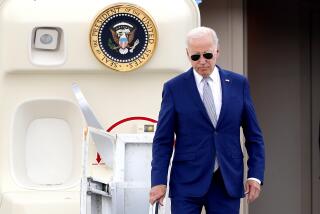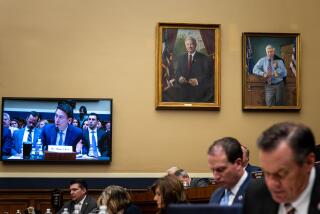Racism Isn’t Just an American Issue
- Share via
The American president’s African trip, lasting 12 full presidential days and focusing on the painful issue of America’s past profit from slavery and racism, garnered relatively pedestrian notice outside the U.S. and Africa. That’s really a shame. The race question should be a more important part not only of America’s soul-searching but of other countries’ as well.
The emotional journey of the president to the land from which about 30 million African Americans claim ancestry provided all the world time to pause and reflect not only on our problem but perhaps even on theirs as well. But few did, especially in Asia. Sure, it’s easy to say, as it often is in Asia, that it’s about time America woke up, ceased giving those predictable human rights lectures to others, stopped trying to sound like God’s gift to nationhood and got its own act togther. In the region, America is sometimes viewed as either a benign hegemonist or, worse, as the historical heir to European imperialist attitudes. This, of course, is not how we Americans think of ourselves, but we do present a complex picture abroad.
We didn’t fully own up to the idiocy and immorality of the World War II internment of Japanese Americans until a decade ago. Even in otherwise live-and-let-live California, discrimination against Asians has been all too common. During the West Coast recession a half dozen years ago, scapegoating of Japanese erupted. During the Rodney King verdict and aftermath, Korean Americans all too often bore the brunt of the violence that erupted. In truth, America has many miles to go and many idealistic promises to keep. Last week, the president’s entourage had barely gotten off the plane when the U.N. released a report, penned by a Senegalese death penalty expert, that criticized the practice of capital punishment in America for producing racist outcomes by disproportionately affecting minorities.
But racism is a horror that tarnishes many nations, not just America. As the late Philippine President Carlos Romulo once put it to his fellow Asians, “Let us work to remove this ugly disease wherever it is rooted, whether it be among Western men or among ourselves.” Consider in Asia such enduring eyesores of the region’s political landscape as India’s “untouchables,” an odious part of a centuries-old caste system. Or Sri Lanka’s unbending Sinhalese Buddhists, who openly flaunt racial superiority over the Tamils. Consider Indonesia’s notorious treatment of minorities in East Timor. Or Japan’s long embrace of “racial homogeneity,” which fuels the culture’s disrespect of minorities. And in New Zealand and Australia, Asian immigrants routinely come under attack during times of stress. Noted the Japan Times, in one of the few thoughtful Asian editorials about the trip: “It is important to remember that the sins of which the U.S. is accused are not that country’s alone. The grievous mistreatment of blacks is, sadly, all too common throughout the world. Nor is such racism a purely Western phenomenon. Japan, too, has much to consider in this regard.”
While visiting colleagues last week at the Graduate School of International Relations and Pacific Studies at UC San Diego, I was asked by a professor there why the U.S. media seemed to have covered this African trip more thoroughly than last fall’s presidential swing through Latin America, even though U.S. strategic and trade interests are so much greater there than in Africa. One reason was surely that the media wanted to give the beleaguered president a break. Another was that a sense of collective American guilt about the past relationship to Africa resonates more sharply than any relationship to Latin America.
If nothing else, the African trip reminded us of how bad we once were, how much more we all have to do and how much more we are all capable of if, as Clinton suggests, we stop avoiding this transcendentally international issue. Prof. Paul Gordon Lauren in the new edition of his groundbreaking book, “Power and Prejudice: The Politics and Diplomacy of Racial Discrimination,” says: “The issue of race is now at the forefront of the international agenda, and no government and no group can claim to be unaware of its implications.” Sometimes a little healthy guilt and self-reflection can go a long way. Others should try it, too.
More to Read
Sign up for Essential California
The most important California stories and recommendations in your inbox every morning.
You may occasionally receive promotional content from the Los Angeles Times.













